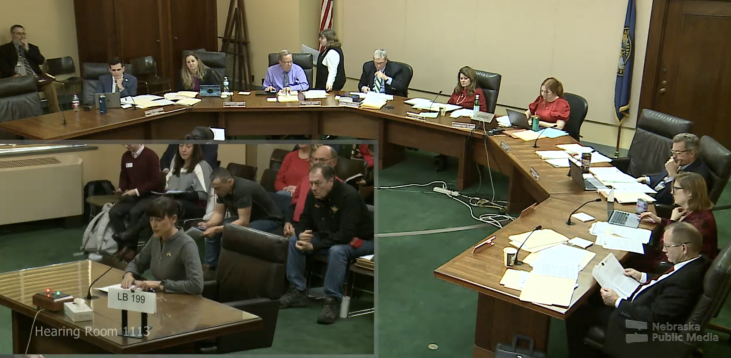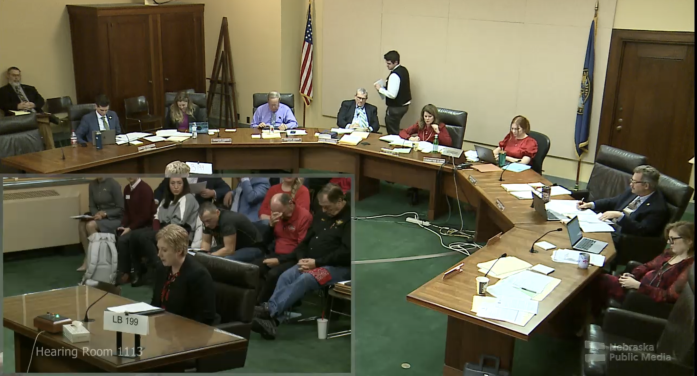Immigrant Legal Center + Refugee Empowerment Center Attorney Jodi Garrelts and Ukrainian Family Assistance Program Supervisor Liubov Onishchuk testified today in front of the Transportation & Telecommunications Committee in support of LB 199, a bill that would provide access to Driver’s Licenses for federally authorized immigrants. Currently, some groups of federally authorized immigrants are unable to get a Driver’s License due to current Nebraska statute. LB 199 would amend this to ensure all federally authorized immigrants can drive safely on our roads. Read their testimonies below.

Ukrainians are grateful to have a peaceful and safe land to be in, they are extremely grateful. However, they have a culture of hard work and believe in contributing to the society they live in. They believe in paying their own way and not relying on public benefits and other people to get by. In other words, they have true Nebraska values that require that they are able to get drivers licenses to be able to make hard work a possibility for them.
Liubov Onishchuk, Ukrainian Family Assistance Program Supervisor Tweet
My name is Liubov Onishchuk, I was born and raised in Ukraine and moved to the USA in 2010. As war started my friends and family started to welcome Ukrainians in our homes to provide them a safe place to be when they arrived. When Refugee Empowerment Center/Immigrant Legal Center started providing help to Ukrainians, I joined them as a Ukrainian Family Assistance Program (UFA) Program Supervisor in Omaha. I am testifying today on behalf of REC/ILC and on behalf of my new Ukrainian family and friends here in NE. We want to support LB199, which provides changes in the law that authorize a “driving privilege card” for Ukrainian parolees.
First, I would like to thank Nebraska for giving Ukrainians an opportunity to be here. Ukrainians are safe here, they are allowed to go to school, they can receive medical help and parents can work. Although Ukrainians would love to be living peacefully at home, we are grateful for our second home here in Nebraska. Nebraska is a beautiful state with much land, but as a result the cities spread out wide. We have bus routes, but they are very limited to particular areas and times of the day. Due to sponsors who helped Ukrainians to settle living on the outskirts of the city such as in Elkhorn, as well as limited landlords who will lease to tenants with no US credit history, the vast majority of the Ukrainian parolees live in the areas where there is no public transportation.
The jobs are very limited in the areas they live in. Many Ukrainians come with work experience and excellent educational qualifications, but to receive certifications that are relevant here, they have to go back to college. Without transportation, they can neither access college nor relevant employment. I have clients who have years of experience driving semi trucks but are unable to get their CDL licenses here.
I will give an example of this inconvenience in one young lady I work with. She has medical qualification as a midwife. However, as this certification cannot be used in the USA, she will have to go back to college to get a USA certification. The only transportation shewas able to find waswith oneof my colleagues who lives near her in Elkhorn and brings her to our office, therefore she had to find a job close to our office doing nails. On days this colleague cannot bring her, she has to walk 8 miles to the nearest bus at Village Pointe, then take 2 transfers to get to work. The full trip one way is about 3 hours long. She is very fortunate to be able to have this transportation with my colleague so that she can pay rent for her 4 siblings that she came with – many other Ukrainians are unable to work due to transportation restrictions, even though they had been driving every day to work in Ukraine.
We also have a young disabled man who has just arrived to the States a few days ago. He was a carpenter in Ukraine. He has 3 little kids and now heavily relies on his wife, as using a bus is very hard with his disability, since he is unable to travel from his home to the bus. It has been very hard adjusting to the idea that he can no longer have the independence to provide for his family and get around by car that he once did.
Ukrainians are grateful to have a peaceful and safe land to be in, they are extremely grateful. However, they have a culture of hard work and believe in contributing to the society they live in. They believe in paying their own way and not relying on public benefits and other people to get by. In other words, they have true Nebraska values that require that they are able to get drivers licenses to be able to make hard work a possibility for them.

LB 199 will correct the nonsensical outcomes produced by our current law and ensure that parolees and other noncitizens who are present with the permission of the U.S. government have the ability to drive lawfully in Nebraska. This bill serves the interests of our immigrant and refugee communities and every Nebraskan who uses our roadways, and we urge this committee to support it.
Anna Deal, Legal Director Tweet
Testimony read by Jodi Garrelts, Attorney.
I am testifying today on behalf of Anna Deal, Legal Director of Immigrant Legal Center (ILC), a nonprofit immigration law firm engaged in direct legal services, education, and advocacy for immigrants and refugees across Nebraska. We specialize in humanitarian forms of immigration relief available to individuals fleeing persecution, survivors of abuse, and others who cannot return to their country of origin due to violence or insecurity. ILC recently merged with an Omaha-based refugee resettlement agency, Refugee Empowerment Center (REC). REC provides initial resettlement and supportive services to traditional refugees and certain other eligible populations, most recently Afghan and Ukrainian parolees.
ILC and REC routinely serve noncitizen clients who, although present in the U.S. with the knowledge and consent of the federal government, are ineligible for a driver’s license in Nebraska. The REAL ID Act lists ten categories of immigrants eligible for a license that is recognized for official federal purposes,[1] but this list fails to encompass all lawfully present noncitizens. Nebraska, in turn, only offers one class of license—a REAL ID-compliant document that is only available to the ten noncitizen categories enumerated in that federal statute.[2] By creating a second type of state-issued driver’s license, which the REAL ID Act specifically contemplates and permits,[3] LB 199 presents a commonsense fix that will give noncitizens who demonstrate they are present in the U.S. with government permission the ability to drive lawfully in Nebraska.
The largest category that stands to benefit under the bill is comprised of noncitizens who have been granted parole. Parole in the immigration context is entirely distinct from parole in the criminal law context. Parole is a legal mechanism through which any Department of Homeland Security (DHS) subagency can exercise discretion to permit a qualifying individual to enter or remain in the United States for a specified period of time and often for a discrete purpose.[4] Parole may be granted for “urgent humanitarian reasons,” like receiving critical medical treatment in the U.S., or for “significant public benefit,” such as serving as a witness in a U.S. legal proceeding. Parolees are eligible for employment authorization for the duration of their parole period.[5] In addition to the general parole process, Congress and DHS have, from time to time, established special parole programs based on compelling circumstances faced by certain populations. Parole decisions under these programs are still made on a case-by-case basis, and DHS can end a program when it determines it is no longer necessary.
One such special parole program is “Uniting for Ukraine,” an expedited process for individuals and organizations in the U.S. to apply for Ukrainian citizens to receive parole for a two-year period.[6] Nebraska-based sponsors have applied for parole for almost 750 Ukrainian families since April of last year.[7] Our agency is now assisting dozens of Ukrainian parolees in securing housing, work authorization documents, and employment. Yet without the ability to obtain a license to drive to work, school, church, or to visit with friends, these Ukrainian newcomers will not feel welcomed or achieve self-sufficiency in Nebraska.
Beneficiaries of other special parole programs will also benefit from LB 199. For example, the spouse, widow(er), son, or daughter of a petitioning U.S. military member[8]; a Cuban or Haitian with an approved visa petition filed by a U.S. citizen or permanent resident family member[9]; and certain foreign national entrepreneurs who have demonstrated that there is significant public benefit to their U.S. business venture.[10] Although the U.S. government created parole programs for these populations due to obvious family unity, humanitarian, and public policy concerns, current federal and state law precludes them from driving lawfully in Nebraska.
Beyond parolees, LB 199 would benefit certain other narrow noncitizen categories, all of whom are present in the U.S. with the knowledge and consent of the federal government. For example, individuals granted withholding of removal or protection under the Convention Against Torture because an immigration judge determines they are likely to be persecuted or tortured in their country of origin.[11] Such persons remain in the U.S. in their protected status indefinitely, yet they are precluded from driving lawfully in Nebraska. Another group consists of survivors of human trafficking for whom U.S. law enforcement has requested Continued Presence (CP) due to their potential value as witnesses.[12] The Continued Presence program aims to provide victims with stability and security to facilitate their cooperation in prosecuting trafficking, but persons in CP are unable to obtain a driver’s license under existing Nebraska law.
LB 199 will correct the nonsensical outcomes produced by our current law and ensure that parolees and other noncitizens who are present with the permission of the U.S. government have the ability to drive lawfully in Nebraska. This bill serves the interests of our immigrant and refugee communities and every Nebraskan who uses our roadways, and we urge this committee to support it.
[1] Under section 202(b)(B) of the REAL ID Act, only the following immigration statuses are listed as eligible for a license that complies with REAL ID requirements: lawful permanent residents, lawful temporary residents, conditional residents, asylees, refugees, nonimmigrants, asylum applicants, people who have applied for or been granted temporary protected status, people granted deferred action, people who have applied to adjust to lawful permanent residence, and certain citizens of the Marshall Islands, Micronesia, and Palau.
[2] See Neb. Rev. Stat. § 60-484.04(1).
[3] See 202(d)(11) of the REAL ID Act.
[4] See 8 U.S.C. § 1182(d)(5).
[5] 8 C.F.R. § 274a.12(c)(11).
[6] See https://www.uscis.gov/ukraine regarding the Uniting for Ukraine program.
[7] This data is maintained by the office of the Nebraska State Refugee Coordinator.
[8] See https://www.uscis.gov/military/discretionary-options-for-military-members-enlistees-and-their-families discussing Military Parole in Place.
[9] See https://www.uscis.gov/humanitarian/humanitarian-parole/the-cuban-family-reunification-parole-program and https://www.uscis.gov/humanitarian/humanitarian-parole/the-haitian-family-reunification-parole-hfrp-program addressing the Cuban and Haitian Family Reunification Parole programs.
[10] See https://www.uscis.gov/working-in-the-united-states/international-entrepreneur-parole discussing International Entrepreneur Parole.
[11] See 8 USC § 1231(b)(3); Convention Against Torture and Other Cruel, Inhuman or Degrading Treatment or Punishment, G.A. Res. 39/46, Annex, 39 U.N. GAOR Supp. No. 51, U.N. Doc. A/39/51 (1984); 8 C.F.R. §§ [1]208.16 to [1]208.18.
Testimony [12] See https://www.dhs.gov/sites/default/files/publications/continued_presence_pamphlet_ccht_final.pdf addressing Continued Prese
nce.
Stay updated on the latest news, events, and opportunities to support our neighbors. Subscribe to our emails to stay engaged and connected.
©2024 Immigrant Legal Center. All Rights Reserved.